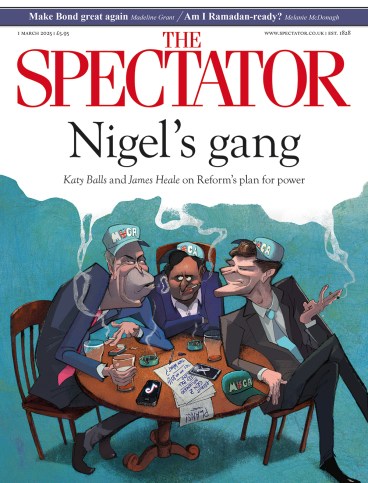
Among British car factories, Nissan at Sunderland is the most productive and Jaguar Land Rover at Solihull probably the most advanced. As for industrial landmarks, the former British Leyland complex at Longbridge is reduced to a research and development facility for Chinese-owned MG; but ‘Plant Oxford’ at Cowley, the original home of Morris Motors now owned by BMW of Germany, still produces 1,000 Minis per day. And BMW’s decision to halt a £600 million project to build electric Minis there is, I fear, a moment of destiny for the whole UK auto industry.
The truth is that the transition to electric cars has descended into chaos. Total UK car production in 2024 was at its lowest (in non-pandemic conditions) since 1954. EVs are too expensive; charging infrastructure is too patchy; manufacturers plead that the current ‘zero-emission vehicle mandate’ (ZEV: 80 per cent of new cars must be electric by 2030, all by 2035) is too tight – though Ed Miliband would like it tighter.
Results are awaited from an industry consultation on how to make the ZEV more workable. But one thing’s for sure: ministerial diktat won’t shift consumer choices; non-urban motorists don’t want to drive electric. And British carmaking, for all its engineering prowess, is wholly dependent on investment decisions from Germany, France, India, Japan and the US, whose domestic markets face the same negative trends and advancing low-cost Chinese competition. BMW’s reversal of Plant Oxford’s fortunes is a signal of much deeper trouble ahead.
Under water
Thames Water is another fiasco. The debt-laden privatised utility is about to borrow £3 billion from existing creditors – on very expensive terms that must feed through into higher water bills for 16 million unhappy customers – as a last resort to stave off collapse that would land big losses on investors and most likely lead to temporary renationalisation. All this for what really ought to be a simple business, supplying water at regulated prices sufficient to keep pipes and reservoirs in good condition and provide steady returns for shareholders.
But Thames never recovered from the decade after 2006 when the Australian bank Macquarie loaded it with debt and gouged it for dividends. Now its best hope for remaining in the private sector may be a bid from CK Hutchison, the Hong Kong group that already owns Northumberland Water and is a flagship company of Li Ka-shing, Asia’s richest and shrewdest conglomerate builder. Li himself is 96, but if his people can’t sort out Thames Water, I doubt anyone can.
Save the cash Isa
Is the Chancellor seriously considering scrapping or restricting cash Isas, the tax-free savings device that attracted a record £50 billion last year? This surge was partly a response to falling interest rates and partly a reflection of UK savers’ customary lack of enthusiasm for riskier investments, including equity Isas. BlackRock, Fidelity, Abrdn and other top fund managers met Rachel Reeves last week, reportedly to discuss ditching the cash Isa in order to divert more capital into the lacklustre market for London-listed equities.
But the idea of an additional UK equity Isa allowance has already fallen away because the sector did not think the product would appeal to customers – so why would cutting tax breaks on cash drive them in that direction? Cash Isas may be a low-margin nuisance for global fund managers, but they were introduced by Gordon Brown long ago to encourage the savings habit, not as a tool for intervening in capital markets.
By scrapping them, Reeves might scoop more revenue from taxable deposits. But if she claims she’s doing it to boost investment-starved high-growth British companies, she’s misguided or bluffing. Meanwhile, don’t forget to take up your £20,000 annual Isa allowance before the end of the tax year. There are four main categories, one of them is cash, and the choice is still yours.
Vote Bogtrotter
I popped into the Cambridge Theatre – at last, having lived next door for four years – to see Matilda the Musical. It’s a terrific show, but does it offer parables for this column? A used-car scam perpetrated by Matilda’s father has echoes of the current car finance scandal – and is brought to order far more effectively by comic Bulgarian gangsters than it might have been by the real-life Financial Conduct Authority.
As to politics, the horrible headmistress Miss Trunchbull instantly recalled Donald Trump but I fear goody-goody Matilda herself may grow up to be a Kamala Harris. For me the brightest hope was Bruce Bogtrotter, the plump kid (played by Adam Hussain) whom Trunchbull forces to eat a huge chocolate cake. When he launched the finale by climbing on his desk to belt out ‘Revolting Children’, I thought: America must find its next-generation President Bogtrotter.
Pedicab menace
On leaving the theatre, we might – if we’d been foolish – have taken a rip-off sightseeing ride in one of those pink-lit pedicabs that most of my neighbours regard as a dangerous public nuisance. Legislation has belatedly given Transport for London powers to regulate these rickety contraptions and their unidentifiable riders; an online consultation closes on 7 March, so do have your say. On the plus side, they’re non-polluting and add colour to the West End scene. On the negative, they’re anarchic and unsafe, they blast out bad music, they’re probably gang-mastered by bad people and there have been reports of assaults on residents who take issue with them.
They’re also busy, a local source tells me, ‘ferrying customers to pop-up brothels’ – to which I can attest, having been hailed in Soho from a passing pedicab with a hissed ‘Sir, sir! I have 12 girls for you!’ ‘Twelve?’ I muttered. ‘Who does he think I am, Donald Trump on a Moscow business trip?’








Comments